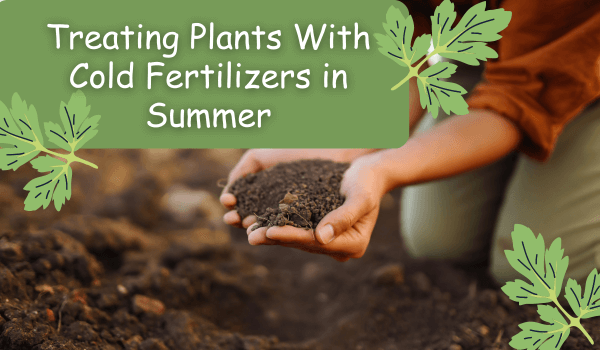In the heat of summer, it’s not just humans who struggle; trees and plants also contend with its effects. The impact of excessive heat becomes evident in the growth of plants. During summer, plants tend to wilt, requiring more moisture and adequate care to maintain their lush greenery. Providing nourishment to plants in this heat is essential for their sustenance. To provide nourishment to plants in this heat, use cool fertilizer. This helps prevent plants from suffering due to the heat, ensuring they remain healthy and vibrant throughout the summer season.
What is a Cold Fertilizer?
Cold Fertilizer refers to fertilizers or manures that help keep plants cool during the hot summer months. In this season, various types of organic fertilizers such as compost, cow dung, leaf compost, and compost made from fruit and vegetable peels can be applied to plants. Not only do these fertilizers provide essential nutrients to plants, but they also impart a cooling effect. During summers, it’s advisable to predominantly use liquid fertilizers.
How To Make Cold Fertilizer?
You can prepare cold fertilisers through different components. Let us know about these components and understand how to make them.
Through Seaweed
Seaweed is an organic fertilizer containing essential nutrients such as nitrogen, potassium, phosphorus, calcium, boron, and zinc. It helps plants withstand adverse weather conditions and can be used in any season. Mixing 3 to 4 milliliters of seaweed in 1.0 liter of water and spraying it on the roots and leaves of plants promotes their growth and resilience.
Through Leaf Compost
Leaf compost refers to the fertilizer made by collecting and composting fallen leaves from trees and plants. This organic fertilizer enriches the soil, enhances its fertility, and improves water retention capacity. During summers, it helps in keeping the roots of plants cool, thereby promoting healthy growth. Leaf compost can be prepared at home or purchased from nurseries. Simply scatter a handful of leaf compost around the base of a plant and gently water it for effective utilization.
Through Cow Dung
Cow dung manure is considered one of the most beneficial fertilizers for plants, especially during the summer season. This manure provides plants with all essential nutrients in an easily accessible form. It can be prepared in liquid form and applied directly to the plants. To prepare, soak 100 grams of cow dung manure in 5 liters of water for two days. Then, spread this solution around the base of the plants, ensuring even coverage around the roots. This organic fertilizer helps in promoting healthy growth and improving the overall health of plants, making it a popular choice among gardeners.
Through VermiCompost
Vermicompost is rich in various nutrients, providing plants with essential elements such as nitrogen, phosphorus, potassium, and micronutrients. It is produced through the process of composting organic materials with the help of earthworms. Adding 100 grams of vermicompost to a pot can significantly enhance the soil’s fertility and promote plant growth. After adding the compost, it is important to water the plants lightly to facilitate the absorption of nutrients by the roots. Vermicompost is known for its ability to improve soil structure, increase water retention capacity, and stimulate microbial activity, making it a valuable organic fertilizer for gardeners and farmers alike.
Through Composting
Compost Manure can be prepared using fruit and vegetable peels, offering a sustainable way to recycle kitchen waste and enrich soil fertility. This nutrient-rich compost can be applied to plants grown indoors or in home gardens. It is particularly beneficial during the summer months when plants require additional nourishment to thrive in the heat. Adding a handful of compost to each plant and gently watering it helps ensure that the plants receive the necessary nutrients for healthy growth. Compost manure not only provides plants with essential nutrients but also improves soil structure, enhances moisture retention, and promotes beneficial microbial activity, contributing to overall plant health and productivity.
Through Plant Growth Promoter
Plant Growth Promoter can be utilized to enhance the growth of plants. Its usage can revitalize plants that have stalled in growth due to summer conditions, stimulating their growth and restoring their lush green appearance. By adding 2.0 mL per liter of water, this growth promoter can be effectively employed to promote healthy plant development. The application of plant growth promoters aids in replenishing essential nutrients, optimizing plant metabolism, and bolstering overall plant vigor, thereby fostering robust growth and resilience against environmental stresses. Regular use of growth promoters ensures sustained plant health and vitality.
